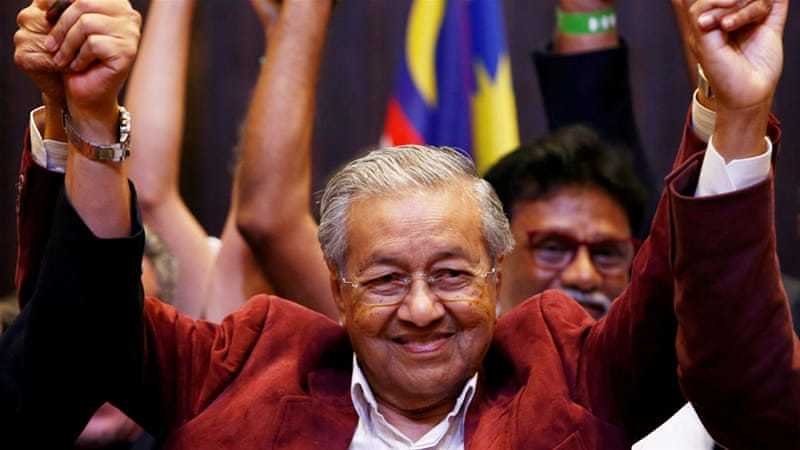(Platts) The surprise outcome of Malaysia’s historic 2018 elections has elevated risks for the oil and gas sector in Southeast Asia, stemming from the winning coalition’s stance on fuel subsidies, its position on Chinese business investment and potential interference in the working of Petronas — one of the largest national oil companies in the region.
Malaysia is currently the world’s third-largest exporter of LNG, having been displaced by Australia from second place in 2017, and the second-largest oil and natural gas producer in Southeast Asia after Indonesia.
The victory of 92-year-old Mahathir Mohamad marks the first regime change in Malaysia since its independence and ramifications across industries are likely, including the energy sector which makes up around 20% of the country’s total gross domestic product.
One of the clearest indications of upcoming changes in energy policy is the election manifesto of Mahathir’s coalition, Pakatan Harapan. In its list of the top 10 promises to deliver in the first 100 days, number two is to stabilize the price of gasoline and re-introduce fuel subsidies.
“The Pakatan Harapan government will provide targeted petrol subsidies at a suitable monthly rate to those who qualify. This will be targeted to those who use motorcycles below 125 cc and cars below 1,300 cc. A quota will be devised to prevent abuse,” the manifesto states.
Mahathir’s pro-subsidy stance will reverse the trend of fuel price reform. Since the oil price crash of 2014, several Asian governments including Malaysia abolished gasoline and diesel subsidies to shore up their finances.
This was widely considered as a positive outcome, as fuel subsidies create artificial demand disconnected from actual global oil prices.
Deregulation allows governments to divert finances to critical areas like education, and invest more in projects that boost energy security such as upstream assets or downstream refineries.
PETRONAS: MALAYSIA’S NATIONAL TREASURE
Perhaps the biggest concern is state-owned Petronas’ vulnerability to government intervention.
Petronas’ relative success as a national oil company is attributed to independence in day-to-day operations, which is unique considering that most Asian national oil companies are burdened with nationalistic objectives that consume their time and resources.
“If you exclude government ownership, we view Petronas’ credit quality as more solid than that of the Malaysian sovereign,” Xavier Jean, senior director for Indonesia and Malaysia Corporate Ratings at S&P Global Ratings said.
“However, we have taken the view so far that the government — as the firm’s sole shareholder — could take actions that may negatively affect the company’s credit standing and balance sheet quality,” Jean said.
He said this “negative intervention” could include higher royalties, taxes, dividends or the provision of substantially larger amounts of subsidies to the economy.
It is too early to estimate a change in the subsidy regime and Petronas’ balance sheet is among the most solid of all publicly rated oil and gas majors globally at nearly MR128 billion ($32.40 billion) of cash as of December 31, 2017, with limited debt given its earnings profile, stable operations and peaking investment, Jean added.
Interestingly, Mahathir’s coalition manifesto calls for Malaysia’s oil and gas producing states to be given higher royalties, which it said was denied by the previous government based on political leanings.
“The Pakatan Harapan government will increase the royalty payment to Sabah and Sarawak, and other oil producing states, to 20% or of its value equivalent, so that the respective states can take over and fund more of their own development activities,” the manifesto states.
It said the 1974 Petroleum Development Act will be scrutinized to review Petronas’ monopoly on national gas and oil products, especially from Sabah and Sarawak, and enable the states to set up their own oil and gas companies.
Higher royalties may signal a change in the status quo of ownership and revenue sharing for Petronas assets, and raises all sorts of concerns for foreign oil companies invested in the blocks.
THE CHINA DILEMMA
In the run-up to the elections, Mahathir has been vocal about curbing excessive Chinese business investment in Malaysia citing risks of financial and economic vulnerabilities.
This could be a risky prospect for Malaysia’s offshore oil and gas exploration in the South China Sea.
Malaysia’s exploration work off Sarawak on Borneo Island has largely been uncontested by China, despite the fact that several blocks fall into Beijing’s nine-dash line — an arbitrary demarcation that has triggered disputes between China and other claimants such as Vietnam and the Philippines.
Malaysia too disputes China’s territorial claims but has not filed a legal case against China and has preferred to advance bilateral relations between the two countries, according to the US energy department.
Beijing’s good relations with Malaysia have extended to unimpeded oil and gas exploration by Petronas for decades and helped Malaysia become a hub of a multi-billion dollar oil services industry.
Whether Mahathir chooses to maintain this remains to be seen.



